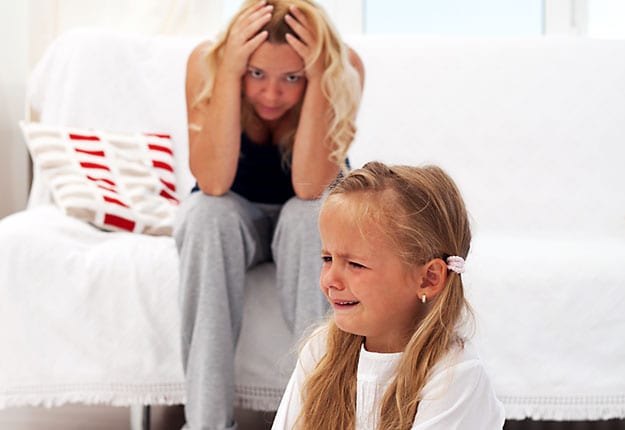People often yell as they feel a loss of control and are overwhelmed with a situation or person. Yelling is an expression of anger that very rarely solves the problem.
Children know how to push the right buttons and always seem to choose the day to ignore or rebut your requests on a day when your stress levels are already heightened. For the most part, children will bounce back and complete the task required after they have been reminded. However, there is also research to suggest that yelling affects children differently depending on the child and their demeanour.
Kids Tend To Tune Out When Yelled At
Children tend to disregard the message being conveyed whilst being yelled at and tune out. Their focus is directed to the tone and volume of the voice, rendering the requests virtually useless. Children are usually more responsive when a message has been delivered clearly and calmly.
Knowing how to manage or get through to a child without raising your voice can be challenging.
Dr Anna Cohen, Sydney’s Leading Clinical Child Psychologist from Kids & Co. shares tips on how to control your temper and avoid yelling when your children are testing your patience.
1. Give effective instructions
Parents need to avoid falling into the trap of raising your voice when asking your child to do something. This can be challenging as the child may continually ignore you. As a parent, you need to change the way you are asking for help rather than raise your voice.
Raising your voice in these situations reiterates to the child that the next time mum or dad would like them to do something, it is not until they have raised their voice that it really needs to be done. You will find yourself in a negative cycle of only getting the response from the child when your voice has been raised.
2. Give a task ownership
When a child continually ignores instructions parents often follow through with a threat. Parents should avoid using threats such as “If you don’t clean your room then you can’t go to the park with your friends”. Instead, use language like “Molly, once you have cleaned your room, then you may go to the park with your friends”.
The second statement gives ownership to the task and is viewed as a reward for the child’s good behaviour rather than a punishment. Using the child’s name in the sentence when asking them to complete a task is more effective than asking an open-ended question. By putting ownership to the task the child understands that the task is for them to complete and not another family member or friend.
3. Recognise warning signs
Individuals recognise signs of anger and deal with anger differently. Knowing your telltale signs is very important to reduce the desire to yell. People generally experience various physical and emotional triggers when they are becoming angry, clenched jaw, increasing heart rate or they perspire. You may also notice that you become more sarcastic, pace backwards and forward and then finally raise your voice to get your point across. Once you have found ways to recognise your signs it becomes a lot easier to stop yourself when you feel the urge raise your voice.
4. Moment of evaluation
Yelling is a tool that allows us to unload our anger and feel temporarily emotionally lighter. However yelling can have negative impacts on our children, there are lots of situations where it seems necessary when you have had a bad day at work and come home to a messy house, you repeatedly have to ask your child to turn the television off and so on. Children model adult’s behaviour, if you handle stressful situations by yelling, your child will too learn that the only way to cope is to yell. Parents need to take a moment to breathe, reflect on the situation and rethink their approach. This will often result in a more productive outcome and a better response from the child as they no longer feel threatened or caught off guard.
Yelling affects the relationship between the parent and the child, therefore it is important to reduce the frequency and necessity to yell. By taking a moment to reflect on the situation and being able to identify when you are getting annoyed you are able to handle the situation in a more mature manner. If you are unable to find a balance and still feel as though you are angry all the time, then there is support available. It may be necessary to consult a specialist for both yours and your child’s needs.
From more information or professional advice contact Sydney’s leading Child Clinical Psychologist, Dr Anna Cohen at Kids & Co. – www.kidsandco.com.au
Share your comments below
Image stock photo




















-

-
-
meedee said
- 15 Aug 2022
-

-
-
shilto02 said
- 25 May 2018
-

-
-
joanne said
- 20 May 2018
-

-
-
rovermum said
- 16 May 2018
-

-
-
ella12 said
- 15 May 2018
-

-
-
sars_angelchik said
- 15 May 2018
-

-
-
BellaB said
- 14 May 2018
-

-
-
becstalou said
- 13 May 2018
-

-
-
ashna9 said
- 13 May 2018
-

-
-
Cookfromscratchmum said
- 13 May 2018
-

-
-
Ellen said
- 13 May 2018

-

-
-
mom93821 said
- 13 May 2018
-

-
-
mom201472 said
- 12 May 2018
-

-
-
mom94125 said
- 08 Oct 2017
-

-
-
june11 said
- 17 Jun 2017
-

-
-
mom101628 said
- 25 May 2017
-

-
-
Ellen said
- 24 May 2017

-

-
-
BellaB said
- 23 May 2017
-

-
-
mom206279 said
- 23 May 2017
Post a comment10:58 am
4:20 pm
10:34 am
9:15 am
4:24 pm
1:37 pm
10:29 pm
8:48 pm
-

-
-
mom93821 replied
- 15 May 2018 , 6:25 am
Reply8:10 pm
11:19 am
7:29 am
7:27 am
9:01 pm
2:51 pm
10:16 pm
10:14 pm
12:19 pm
3:58 pm
12:21 pm
To post a review/comment please join us or login so we can allocate your points.